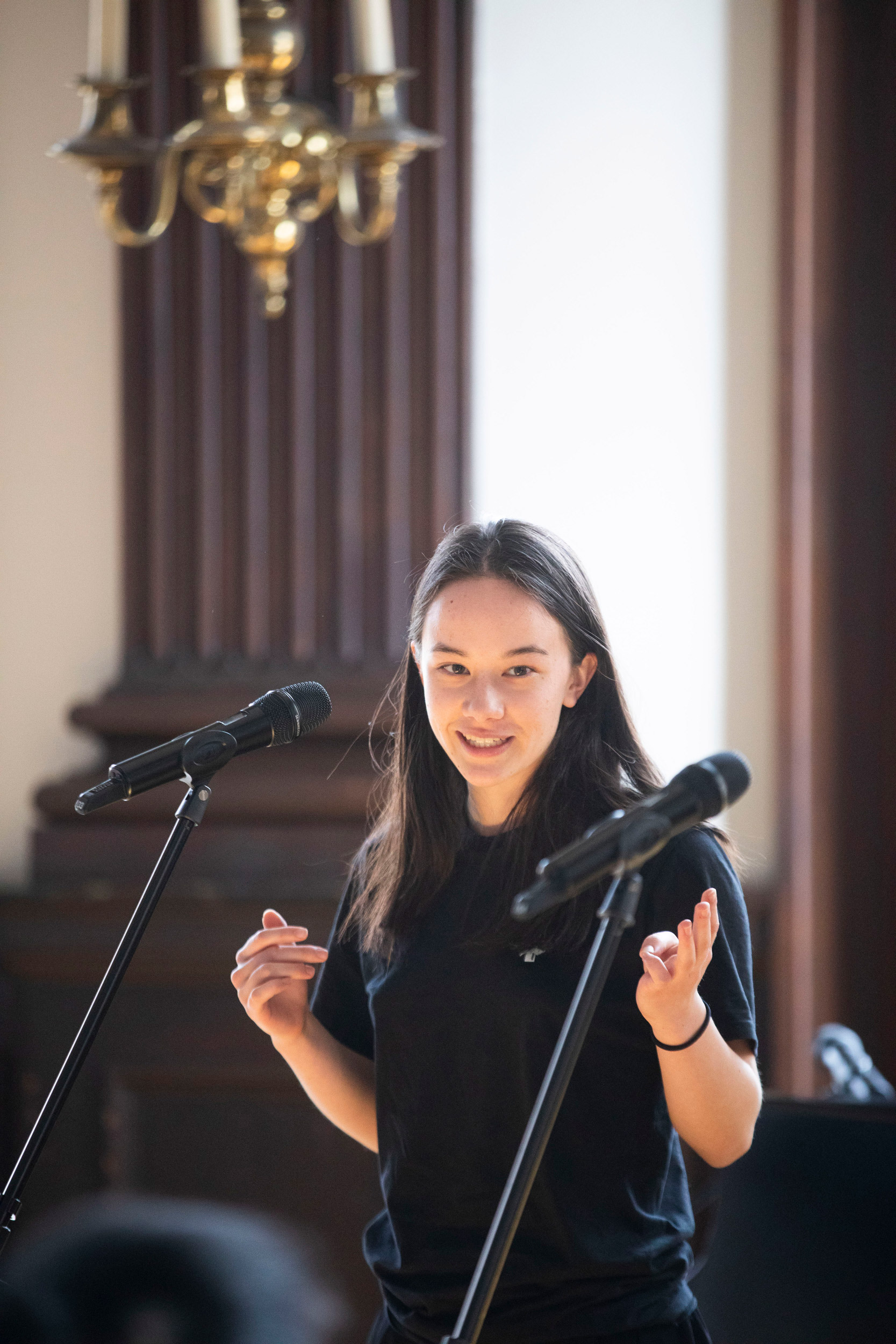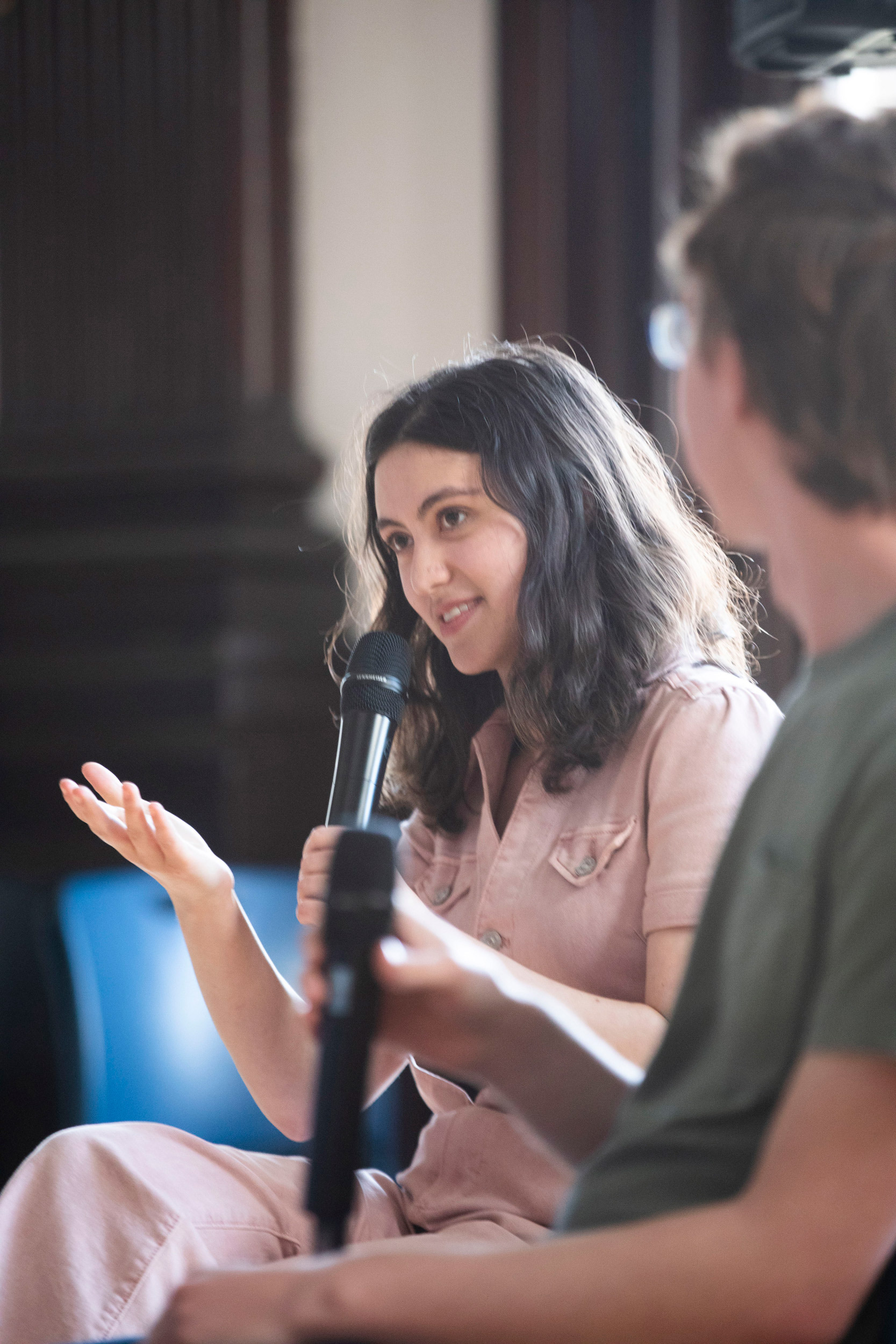Playwright Michael R. Jackson urges students to heed ‘tickle’ of muse
Pulitzer, Tony winner talks lyrics, character conflict, harnessing inspiration at CompFest

“What I always say to young artists is that you have to have a real conversation with yourself about whether that’s what you want to do,” said Michael R. Jackson, best known for his hit Broadway musical “A Strange Loop,” which won a Pulitzer Prize in 2020. Karina Cowperthwaite ’23 is seated next to Jackson.
Photos by Kris Snibbe/Harvard Staff Photographer
For Michael R. Jackson composing a piece of music starts with the “flame” of an idea that a writer needs to chase. First there’s an impulse, the “tickle” of a muse, the award-winning playwright said, and it’s up to the composer to harness it, and turn it into material that can be used.
“For me, it’s just about constantly coming back to it and coming back to it and coming back to it, like ‘Can I catch it? Can I catch that lightning bug in a jar?’” Jackson told Harvard students, sitting in the Horner Room of the Agassiz Theatre.
Jackson, best known for his hit Broadway musical “A Strange Loop,” which won a Pulitzer Prize in 2020 and a Tony Award for Best Musical in 2022, was the keynote guest at the annual Harvard Student Composers Festival (CompFest) April 12, where he led a workshop with student composers before a live audience, listening to students perform songs from original musicals and offering feedback.
Students took turns performing songs for Jackson from three original student musicals: “Queen of Magic” by Veronica Leahy ’23 and Andrew Van Camp ’23, “OUT” by Kalos Chu ’23, and “Atalanta” by Mira-Rose Kingsbury Lee ’23.
In several instances, Jackson recommended the students add characters to their musical scenes to help the audience visually see a source of conflict the lyrics describe. The “Atalanta” song “Playing God” describes the protagonist facing blackmail, needing to choose between resigning her job and betraying her brother. Jackson suggested that Kingsbury Lee bring the character’s blackmailer onstage for the song to make the tension more visible.
“Anytime you can, in music, bring two or three people in conflict with each other, you’re really cooking with gas there,” Jackson said. “It’s always going to be a lot stronger than having them alone.”
Jackson also recommended that student composers think carefully about the order of the ideas in their songs. He used the lyrics to “Mary Had a Little Lamb” as an example, explaining how the nursery rhyme establishes first that Mary has a lamb, then that its fleece is white, and then that it follows Mary everywhere.
“It’s not necessarily being on-the-nose. You can still be quite lyrical and poetic with it,” Jackson said. “But it’s one idea as opposed to mixing multiple ideas within one verse.”


Students performed songs from their pieces: Mira-Rose Kingsbury Lee ’23 did one from “Aatlanta” and Veronica Leahy ’23 performed one from “Queen of Magic.” Leahy was also the artistic director of CompFest.
Jackson is no stranger to dealing with complexity. “A Strange Loop” tells the story of a young, gay Black artist who is trying to write a musical (which is about a young, gay Black artist writing a musical) while battling his inner thoughts.
On the day of his visit Jackson was fresh off the premiere of his latest musical, “White Girl in Danger,” a satirical show set in an imaginary soap opera town, which had opened off-Broadway just two days before.
At CompFest, Jackson opened up about his path to success, which wasn’t easy. He recalled working many “terrible” noncreative day jobs to sustain his art.
“I wanted it badly enough that I just stuck with it, even during the most difficult times,” Jackson said. “What I always say to young artists is that you have to have a real conversation with yourself about whether that’s what you want to do. I would always encourage everybody to be very real with yourself about what you’re willing to put up with while you’re doing the thing that you are pursuing.”
After the event, Kingsbury Lee said it was “extraordinary” to be able to hear Jackson’s thoughts on her songs, saying she will make good use of the advice.
“I thought a lot of his feedback was really cogent and helpful,” Kingsbury Lee said. “I’ve been writing “Atalanta” for 10 years, and this is the first time someone who really does this professionally has looked at it. I think a lot of what he said did resonate with me quite a bit, and that’s something I look forward to implementing.”
CompFest is presented by Harvard’s Office for the Arts. Started in 2021 by artistic director Veronica Leahy ’23, it includes three days of musical performances and commentary from professional composers. Besides Jackson, this year’s festival also featured Linda May Han Oh, Berklee College of Music associate professor, and Vijay Iyer, Franklin D. and Florence Rosenblatt Professor of the Arts.
“This week is just about celebrating the diversity of talent here,” Leahy told audience members at Jackson’s workshop. “These events are really hitting the ethos of the whole festival, which is just a gathering to talk about music and share music.”




